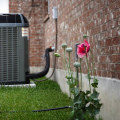Most air conditioning units still use refrigerants that are greenhouse gases (GHGs) thousands of times more powerful to trap heat in the atmosphere than carbon dioxide, the main GHG. Scientists say this heat wave would have been “practically impossible without global warming”. And heat waves will become more frequent, prolonged, and deadly as the decades go by. This makes air conditioning a lifesaving adaptation to climate change.
However, it's hard to feel good about it because air conditioning also worsens global warming. In recent years, the use of air conditioning has become increasingly widespread, and with it, the need to understand its impact on global warming. While air conditioning can be a lifesaver in extreme heat, it can also contribute to global warming if not used responsibly. In this article, we'll explore the effects of air conditioning on global warming and what can be done to reduce its impact. In fact, some of them can be substances such as carbon dioxide, which can be used as an alternative refrigerant thanks to the thermodynamic properties of gases and to the methods common in heat pump technologies.
CO2-based refrigeration systems use highly compressed CO2 and then manipulate gas pressure. When gas expands due to reduced pressure, it absorbs heat. Unlike many common refrigerants, which may have a greenhouse gas potential several orders of magnitude higher than CO2, any CO2 leak from these cooling systems has minimal warming potential. Refrigeration systems based on CO2 use highly compressed CO2 and then manipulate gas pressure. Unlike many common refrigerants, which may have greenhouse gas potentials orders of magnitude greater than CO2, any CO2 leak from these refrigeration systems has minimal warming potential. The increased use of air conditioning technologies is both a cause and an effect of climate change.
Greenhouse gas emissions from air conditioners are expected to increase as economic growth boosts efforts to control both temperature and humidity. While the energy used to power air conditioners has already been studied extensively, the impact of removing moisture from the air has yet to receive adequate scientific attention. According to a new study led by the National Renewable Energy Laboratory (NREL) and Xerox PARC, humidity control is, in fact, responsible for approximately half of energy-related emissions. While the energy used to power air conditioners has clear implications for greenhouse gas emissions, the impact of removing moisture from the air has not been studied in depth until now. From shipping containers to home food storage and refrigerated buildings and buses, refrigeration and air conditioning are present in many domestic and commercial environments. In houses, not in units with windows, but in single-room air conditioners, similar to those usually installed in apartment buildings in India, where the competition will take place. New air conditioners won't be enough to prevent these deaths.
Other measures also need to be taken, such as building with better insulating materials than glass and concrete. To address that problem, several teams are looking for ways to dehumidify the air before it cools down. As part of the study, researchers considered the impact of climate change on the energy use of air conditioners by 2050. Depending on the specific country, there are labels and manufacturing certifications for room air conditioners or household refrigerators that have energy efficiency ratings.
Even a small amount of moisture in the air can make people feel uncomfortable and even damage buildings in the form of mold and mildew. By the end of the century, greenhouse gas emissions from air conditioning will represent an increase of up to 0.5 degrees Celsius in global temperatures, according to calculations by the World Economic Forum. Existing vapor compression technology uses harmful refrigerants to cool the air long enough to remove its moisture, which often overcools the air and wastes energy. Transaera, a Massachusetts Institute of Technology (MIT) startup, for example, collaborates with Qingdao Haier Air Conditioner Gen Corp.
And the other thing is smart intervention, such as the use of smart thermostats in homes and offices that adjust air conditioning according to the time of day and when people occupy spaces. In conclusion, while air conditioning can be a lifesaver during extreme heat waves caused by global warming, it can also contribute significantly to global warming if not used responsibly. To reduce its impact on global warming we need better insulation materials for buildings; more efficient energy labels for room air conditioners; smarter thermostats; and alternative refrigerants such as carbon dioxide.


